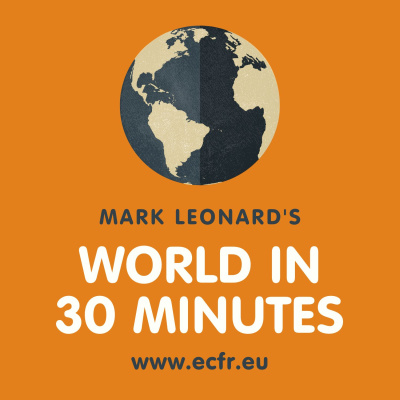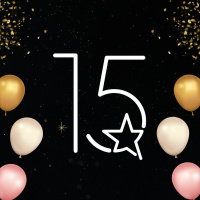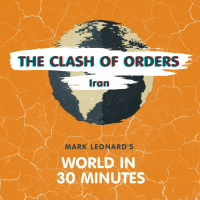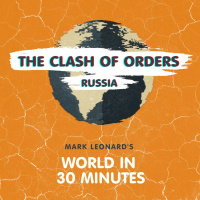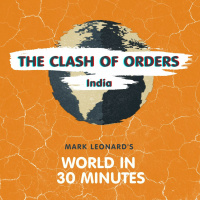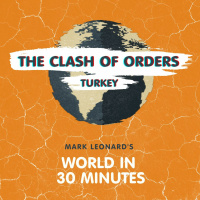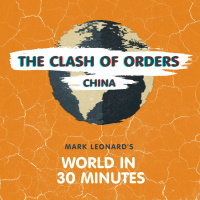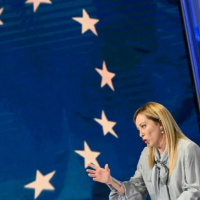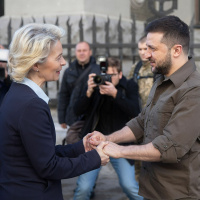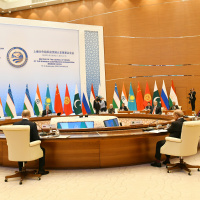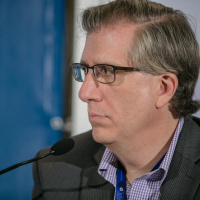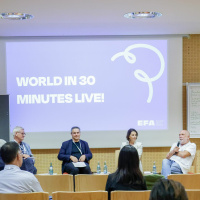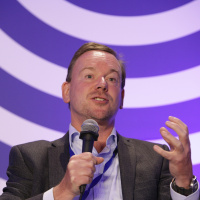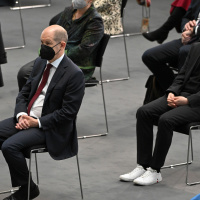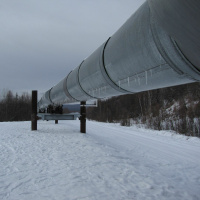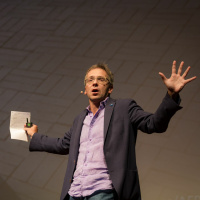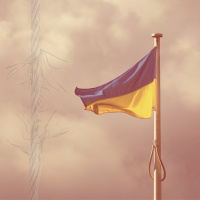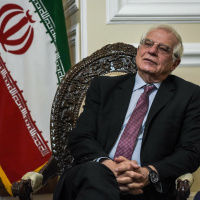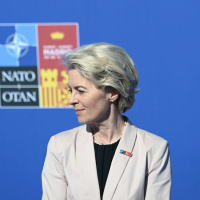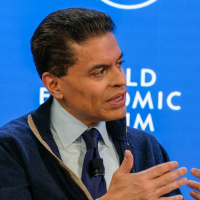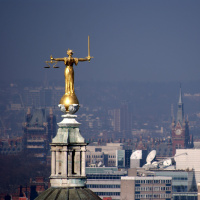Synopsis
Foreign policy podcasts hosted by Mark Leonard, Director of the European Council on Foreign Relations (ECFR), the first pan-European think-tank.
Episodes
-
15 years of ECFR: Reflections on Europe in a tumultuous world
11/11/2022 Duration: 30min9 November is a day of low and high points in history – moments of both loss and of joy. Some important examples include the Pogromnacht in 1938 or the fall of the Berlin Wall in 1989, which marked the end of the cold war. But 9 November 2007 was also the day that brought ECFR’s 50 founding members together, united by a sense that the EU member states could combine their values and resources to become a prototype for a global open society.In this special episode, ECFR council member Mabel van Oranje hosts director Mark Leonard, as well as ECFR founding members Timothy Garton Ash, professor of European studies at the University of Oxford, and Ivan Krastev, chair of the board at the Centre for Liberal Strategies in Sofia. They explore how the momentous historical events of 9 November can help Europeans make sense of the current moment of disorder. Is a reversal happening of the world order brought about by 9 November 1989? What has ECFR’s role been in helping Europe find a strong, united voice and what will it
-
The Clash of Orders with Vali Nasr on Iran
04/11/2022 Duration: 39minMany Europeans see the war in Ukraine as an attack on the ‘rules-based order’. But to many people in other parts of the world, there is no consensus on a set of rules to govern global affairs – and no sense of order. In this mini-series, Mark Leonard will go on an intellectual tour of the world, talking to key thinkers about how order is being defined by different powers. He explores how the clash between these different notions plays into the big shocks facing the world – from climate change and future pandemics to geopolitical struggles and technological disasters – and what this means for national and global politics.---In this fifth episode, Leonard is joined by Vali Nasr – Majid Khadduri professor of International Affairs and Middle East Studies at the Johns Hopkins -SAIS, and a non-resident senior fellow at Atlantic Council’s South Asia Center – to learn more about the Iranian perspective on global order. What role does anti-Americanism play in advancing Iran’s interest in the Middle East? How are notio
-
The Clash of Orders with Fyodor Lukyanov on Russia
28/10/2022 Duration: 32minMany Europeans see the war in Ukraine as an attack on the ‘rules-based order’. But to many people in other parts of the world, there is no consensus on a set of rules to govern global affairs – and no sense of order. In this mini-series, Mark Leonard will go on an intellectual tour of the world, talking to key thinkers about how order is being defined by different powers. He explores how the clash between these different notions plays into the big shocks facing the world – from climate change and future pandemics to geopolitical struggles and technological disasters – and what this means for national and global politics.---In this fourth instalment, Leonard is joined by Fyodor Lukyanov – chair of the Council on Foreign and Defense Policy and editor-in-chief of the Russia in Global Affairs journal – to learn more about the Russian perspective on global order. Why is the Kremlin so keen on regional integration? How can power guarantee freedom and achieve justice in a rules-based order? And finally, what role do
-
The Clash of Orders with Pratap Bhanu Mehta on India
21/10/2022 Duration: 34minMany Europeans see the war in Ukraine as an attack on the ‘rules-based order’. But to many people in other parts of the world, there is no consensus on a set of rules to govern global affairs – and no sense of order. In this mini-series, Mark Leonard will go on an intellectual tour of the world, talking to key thinkers about how order is being defined by different powers. He explores how the clash between these different notions plays into the big shocks facing the world – from climate change and future pandemics to geopolitical struggles and technological disasters – and what this means for national and global politics.---In this third episode, Leonard is joined by Pratap Bhanu Mehta – Laurance S Rockefeller visiting professor at Princeton University and former president of the Centre for Policy Research, a New Delhi-based think tank – to discuss the Indian perspective on order. What is the link between civilisational power and Hindu nationalism? Why is the concept of development so important for a just inte
-
The Clash 0f Orders with Aslı Aydıntaşbaş on Turkey
14/10/2022 Duration: 32minMany Europeans see the war in Ukraine as an attack on the ‘rules-based order’. But to many people in other parts of the world, there is no consensus on a set of rules to govern global affairs – and no sense of order. In this mini-series, Mark Leonard will go on an intellectual tour of the world, talking to key thinkers about how order is being defined by different powers. He explores how the clash between these different notions plays into the big shocks facing the world – from climate change and future pandemics to geopolitical struggles and technological disasters – and what this means for national and global politics.--In this second instalment, Leonard is joined by Aslı Aydıntaşbaş, associate senior policy fellow and in-house Turkey expert at ECFR, to talk about the country’s understanding of order. Does Russia’s control and presence in Turkey's backyard pose a strategic problem? How can the Pax Ottomana push back against a Western-dominated world order? And finally, what role do narratives about the Batt
-
The Clash of Orders with Rana Mitter on China
07/10/2022 Duration: 39minMany Europeans see the war in Ukraine as an attack on the ‘rules-based order’. But to many people in other parts of the world, there is no consensus on a set of rules to govern global affairs – and no sense of order. In this mini-series, Mark Leonard will go on an intellectual tour of the world talking to key thinkers about how order is being defined by different powers. He explores how the clash between these different notions plays into the big shocks facing the world – from climate change and future pandemics to geopolitical struggles and technological disasters – and what this means for national and global politics.--In this first episode, Leonard is joined by Rana Mitter, vice-president of the British Academy and professor of the history and politics of modern China at the University of Oxford, to talk about the Chinese understanding of order. How are economic inequalities and covid-19 challenging Chinese stability? What is the role of multilateralism in the international system? And finally, how do na
-
Giorgia on my mind: The Italian election and European foreign policy
30/09/2022 Duration: 32minThe success of Giorgia Meloni's Brothers of Italy in the recent Italian general election has sent shudders around Europe. With Meloni set to form a coalition of right-wingers and Eurosceptics, her foreign policy agenda could call into question the very foundations of the European project. Alongside Poland and Hungary, Italy could join calls for greater national sovereignty, aiming to shift the balance of power away from Brussels technocracy. In this week’s episode, Mark Leonard is joined by ECFR council members Nathalie Tocci, who is the director of Italy's Istituto Affari Internazionali, and Marta Dassu, senior advisor for Europe at the Aspen Institute, as well as Arturo Varvelli, head of ECFR´s Rome Office and senior policy fellow. They discuss the implications of the new government in Rome and whether it does indeed point to a shift to the right. What will be the new government's stance be on Russia and its war in Ukraine? And how could constraints such as debt and the coherence of the coalition challenge
-
Survive and thrive: A European plan to support Ukraine in the long war against Russia
23/09/2022 Duration: 30minVladimir Putin’s announcement of a partial military mobilisation in Russia reinforces the idea that the Ukraine war will not end quickly and that Ukraine and its partners need to prepare for a long war. The Kremlin is sending a clear signal to the West that it will do whatever it takes to succeed—or at least not to fail. For Ukraine to survive and thrive in the long-war, the EU and its member states should formulate a comprehensive mechanism to support their eastern neighbour. In doing so, Europeans can lay the foundations for a functioning Ukraine, deter Russia from further aggression, and perhaps even point the way toward a settlement of the conflict. In this week’s episode, Mark Leonard is joined by ECFR's Piotr Buras, Gustav Gressel, Kadri Liik, and Jeremy Shapiro to describe and debate the potential military, security, and economic aspects of the long-war plan. Why is investment in industrial warfare supply chains so crucial? How can security assurances for Ukraine enhance deterrence and reduce the poten
-
Rogue NATO: The new face of the Shanghai Cooperation Organisation
16/09/2022 Duration: 31minThis week's Shanghai Cooperation Organisation (SCO) summit makes tangible the existence of an alternative international community. Featuring leaders from Russia, China, and India it is the organisation's first face-to-face meeting since the Russian invasion of Ukraine. There is a clear goal at the core of the discussions: power politics and the race to multipolarism as an alternative to Western liberalism. In this week’s episode, Jeremy Shapiro joins an all-star ECFR panel of experts to discuss the summit's geopolitical implications. How is SCO “dialogue partner” Turkey using the Ukraine war to get the best of both worlds? How much will Iran's imminent membership advance its security? And finally, what would be the implications for Beijing if Putin were to lose power, and how can China support the Kremlin? This podcast was recorded on 16 September 2022. Further reading:Rogue NATO: The new face of the Shanghai Cooperation Organisation, by Aslı Aydıntaşbaş, Marie Dumoulin, Ellie Geranmayeh & Janka Oertel:
-
The future of open society with Leonard Benardo
09/09/2022 Duration: 36minAs fundamental freedoms are being challenged worldwide, the very idea of open societies is being questioned. The crisis of liberalism and the decline of the West, together with increased disinformation and polarisation, have revealed inequality and the need for critical public debate as a central issue for the advancement of open societies. In this week’s podcast, Leonard Benardo, executive vice president for the Open Society Foundations, joins Mark Leonard to discuss the great challenges open societies are currently experiencing. What role do identity politics play when thinking about solidarity and social cohesion? How can the digital revolution impact electoral democracy? And finally, how can we ensure that Ukraine as an open society is retained? This podcast was recorded on 6 September 2022.Bookshelf:- "Against Decolonisation. Taking African Agency Seriously" by Olúfẹ́mi Táíwò - "Know Your Enemy" podcast hosted by Matthew Sitman and Sam Adler-Bell - Follow @samagreene and @rochowanski for food for thought
-
Rethinking global interdependence - Live from the European Forum Alpbach
02/09/2022 Duration: 31minGlobal crises – from the covid-19 pandemic and climate change to Russia's war on Ukraine have challenged the core tenets of the globalised world. Europe has been at the centre of this upheaval. And the continent now faces tough decisions on its energy markets, trade partnerships, and supply chains. In this special episode, recorded in front of a live audience at the European Forum Alpbach in Austria, Mark Leonard is joined by co-chair of ECFR, Carl Bildt, Austrian federal minister for the EU and constitution, Karoline Edtstadler, and non-resident fellow at Bruegel, Thomas Wieser. Together, they discuss how to strike the right balance between the need for sovereignty and the benefits of globalisation. What are the biggest threats to the European market economies and what are the opportunities? Will Europeans learn from Russia’s weaponisation of energy when it comes to its dependencies on China? And is there a way to ‘disarm’ connectivity? This podcast was recorded live at the European Forum Alpbach on 1 Septe
-
Another world is possible: The transformative power of political imagination
12/08/2022 Duration: 31minIn his recent book “Another World Is Possible”, Geoff Mulgan – professor of collective intelligence, public policy, and social innovation at University College London – identifies a crisis that does not usually feature prominently in threat assessments: an absence of political imagination. This deficit has not only distorted policymakers’ sense of the past and present but also weakened their ability to make future-proofed decisions in various areas. In this week’s episode, Mulgan joins Mark Leonard to explore the causes and consequences of this crisis. They discuss how to restore imagination and harness creativity to solve current and future problems. Why does the idea of utopia matter? How can we harmonise competing narratives about the future? And where do China and India come in to all this?This podcast was recorded on 6 July 2022.Further readingAnother World Is Possible: How to Reignite Social and Political Imagination by Geoff Mulgan: https://buff.ly/3A1xUgd The Ministry for the Future by Kim Stanley Rob
-
Machtwechsel: The new generation of German politicians
05/08/2022 Duration: 33minGermany's ‘traffic light’ coalition has ushered in a new age of German politics – and a new generation of political figures. Last year, in a departure from the staid Merkel era, German citizens elected a parliament that is less ‘pale, male, and stale’ than ever before. The new cabinet reflects this change – in terms of youth and gender at least. In this week’s episode, Mark Leonard, interviews the German author and journalist, Anna Sauerbrey. They discuss her latest book, “Machtwechsel” (Change of Power), in which she analyses how this diverse intake is challenging the status quo of German politics. But how does Chancellor Olaf Scholz fit in? What is a ‘Zeitgenosse’? And what do white sneakers have to do with anything? This podcast was recorded on 6 July 2022. Further reading - Machtwechsel by Anna Sauerbrey: https://buff.ly/3Spm5au - War and Indignation by Jürgen Habermas in Süddeutsche Zeitung: https://buff.ly/3BCQKvb - A Millennial considers the new German Problem after 30 Years of Peace by Ulrike Frank
-
Winter is coming: Europe’s energy transition and the war in Ukraine
29/07/2022 Duration: 30minAs blistering heatwaves and raging forest fires sweep across Europe, climate change is once again back on the agenda. But Russia’s attack on Ukraine and the consequent reduction in energy supplies to Europe has greatly complicated Europe’s green transition. Some observers argue that a cold-turkey withdrawal from Russian fossil fuels will speed up the transition to renewable energy, but others predict that climate goals will fall by the wayside as European leaders turn to coal and whatever else is available to make up for the lack of Russian oil and gas. In this week’s episode, Jeremy Shapiro, ECFR’s research director seizes the reins of power as host from a vacationing Mark Leonard and talks to Susi Dennison, director of ECFR’s European Power programme, and Simone Tagliapietra, senior fellow at Bruegel about these competing narratives. Will Europe manage to maintain unity as winter approaches? What does this mean for its efforts in climate diplomacy? This podcast was recorded on 19 July 2022. Further reading
-
The Power of Crisis with Ian Bremmer
22/07/2022 Duration: 27minIan Bremmer wrote his latest book before Russia's all-out invasion of Ukraine. Yet, ‘The Power of Crisis’, which went into press on 26 February 2022, identifies three transformational global challenges besides the war: public health emergencies, the technological revolution, and climate change. In today's podcast, Bremmer joins Mark Leonard to discuss the concept of a “goldilocks” crisis, the effects of the covid-19 pandemic, and Europe’s role in global upheavals. How can Europeans learn to survive and even thrive during current and forthcoming crises? And how can countries cooperate effectively in an age of great power competition?This podcast was recorded on 13 June 2022.Further reading- The Power of Crisis by Ian Bremmer https://buff.ly/3uKRbzdBookshelf - The Body Scout by Lincoln Michel Hosted on Acast. See acast.com/privacy for more information.
-
Ukraine in the age of unpeace with Fiona Hill
15/07/2022 Duration: 57minIn July, Mark Leonard launched the newly released paperback edition of his book - "The Age of Unpeace: How Connectivity Causes Conflict" (Penguin) - with a brand-new essay on the war in Ukraine and its geopolitical impact. Together with Fiona Hill, senior fellow at Brookings, and Jason Cowley, editor-in-chief of the New Statesman, he discusses a new way of looking at the origins of the war in Ukraine, the way it is being conducted and the implications for global (geo-)politics. Is the “Age of Unpeace” just another term for a cold war? And will global challenges – like climate change – in the end still bind us together? Or does the “Unpeace” era make us even less able to tackle those? The material for this podcast was recorded on 8 July 2022. Available here: https://buff.ly/3RAyiZCLearn more about “The Age of Unpeace”: - https://soundcloud.com/ecfr/age-of-unpeace - https://www.politico.eu/article/welcome-to-the-age-of-unpeace-geopolitics-conflict/ Bookshelf - There Is Nothing for You Here: Finding Opportun
-
Can the Iran nuclear deal be saved?
08/07/2022 Duration: 32minEU foreign policy chief Josep Borrell’s visit to Teheran in June was meant to revitalise negotiations around the Iran nuclear deal. But the talks, which recently resumed in Doha, remain mired in mistrust and intransigence from both sides. For this week’s podcast, Mark Leonard has assembled a team of Iran experts to take stock of the negotiations in Qatar: ECFR senior policy fellow, Ellie Geranmayeh; former Iranian diplomat and security and nuclear policy specialist at Princeton University, Hossein Mousavian; professor of Middle East studies and international affairs, Vali Nasr; and the director of International Crisis Group's Iran project, Ali Vaez discuss the latest developments and evaluate different possible outcomes and their consequences. Is there any chance of breaking the stalemate without escalation? And what will be the impact of the upcoming midterm elections in the US? This podcast was recorded on 1 July 2022. Further reading:- Borrell in Tehran: How to overcome three obstacles to the Iran nuclear
-
The NATO Summit and the future of European Defence
01/07/2022 Duration: 34minNATO members emerged from their summit in Madrid this week having reached consensus on a new Strategic Concept, Sweden’s and Finland’s accession, and increased readiness capabilities on the eastern flank. This week, Mark Leonard is joined by Nick Witney, senior policy fellow at ECFR and former chief executive of the European Defence Agency; Jana Puglierin, head of ECFR’s Berlin office; and Tara Varma, head of ECFR’s Paris office, to evaluate the summit’s outcomes, especially regarding European defence. How can Europeans coordinate increased military expenditure? What is the European Defence Union? And was Nick Witney right to describe the summit as “the most promising conjunction of planets”? This podcast was recorded on 1 July 2022.Further reading:- NATO’s new Strategic Concept - The EU’s Strategic Compass Bookshelf:- The Way We Live Now by Anthony Trollope - Au café de la ville perdue by Anaïs Llobet - The NATO summit is chance to wean Europe off US military might- Machtwechsel by Anna SauerbreyCover image
-
Lessons for a post-Ukraine world with Fareed Zakaria
24/06/2022 Duration: 34minIn his recently published book, Fareed Zakaria, television host, columnist, and chair of the recently established International Strategy Forum, outlines the main pillars, trends and fault lines of a post-pandemic world. He joins Mark Leonard to discuss the political, geopolitical, and geo-economic changes to the world order. How did the world react to the war on Ukraine? What are the reactions to these reactions? Will globalisation be replaced by fragmentation?This podcast was recorded on 21 June 2022.Further reading:- Ten Lessons for a Post-Pandemic World by Fareed Zakaria: https://buff.ly/3tZQBgO - ECFR’s and Schmidt Futures’ International Strategy Forum: https://buff.ly/3nfeU6CBookshelf: - The Avoidable War — averting a conflict between the US and China by Kevin Rudd- Middlemarch by George Eliot- Dominion by Tom Holland Hosted on Acast. See acast.com/privacy for more information.
-
Peace versus Justice: The coming European split over the war in Ukraine
17/06/2022 Duration: 30minNew ECFR research captures European public opinion on Russia's war against Ukraine. It reveals that Europe's remarkable unity in the early days of the war is under threat from an emerging split – between those who want peace as soon as possible and those who favour justice for Ukraine.This week, senior policy fellow and head of ECFR's European Power programme, Susi Dennison, turns the tables on one of the report's authors, Mark Leonard, as he becomes a guest on his own podcast. They are joined by Leonard's co-author, ECFR founding board member and chair of the Centre for Liberal Strategies, Ivan Krastev to discuss the results of the poll and examine what this means for the European response to the war. What should European leaders do to bridge the fault lines and maintain unity? And how important is Ukraine’s EU membership application? Hosted on Acast. See acast.com/privacy for more information.
